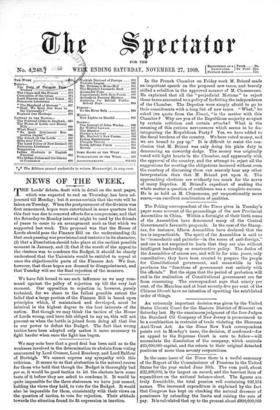In the French Chamber on Friday week M. Briand made
an important speech on the proposed new taxes, and bravely stifled a rebellion in the approved manner of M. Clemenceau. He explained that all the "prejudicial Motions" to reject these taxes amounted to a policy of forfeiting the independence of the Chamber. The Deputies were simply afraid to go to their constituents with a long list of new taxes. "What," he asked (we quote from the Times), "is the matter with this Chamber P Why are you of the Republican majority so upset by certain criticism and certain attacks P What is the meaning of this curious nervousness which seems to be dis- integrating the Republican Party P Yes, we have added to the fiscal burdens of the country. We have voted money, and we are bound to pay up." It is difficult to resist the con- clusion that M. Briand was only doing his plain duty in denouncing an unworthy dodge. The money was originally voted with light hearts in the Chamber, and apparently with the approval of the country, and the attempt to reject all the suggestions for meeting the obligations incurred without even the courtesy of discussing them can scarcely bear any other interpretation than that M. Briand put upon it. The approaching elections are evidently too much for the nerve of many Deputies. M. Briand's expedient of making the whole matter a question of confidence was a complete success. He is as bold as M. Clemenceau, yet unquestionably more suave,—an excellent combination of qualities.














































